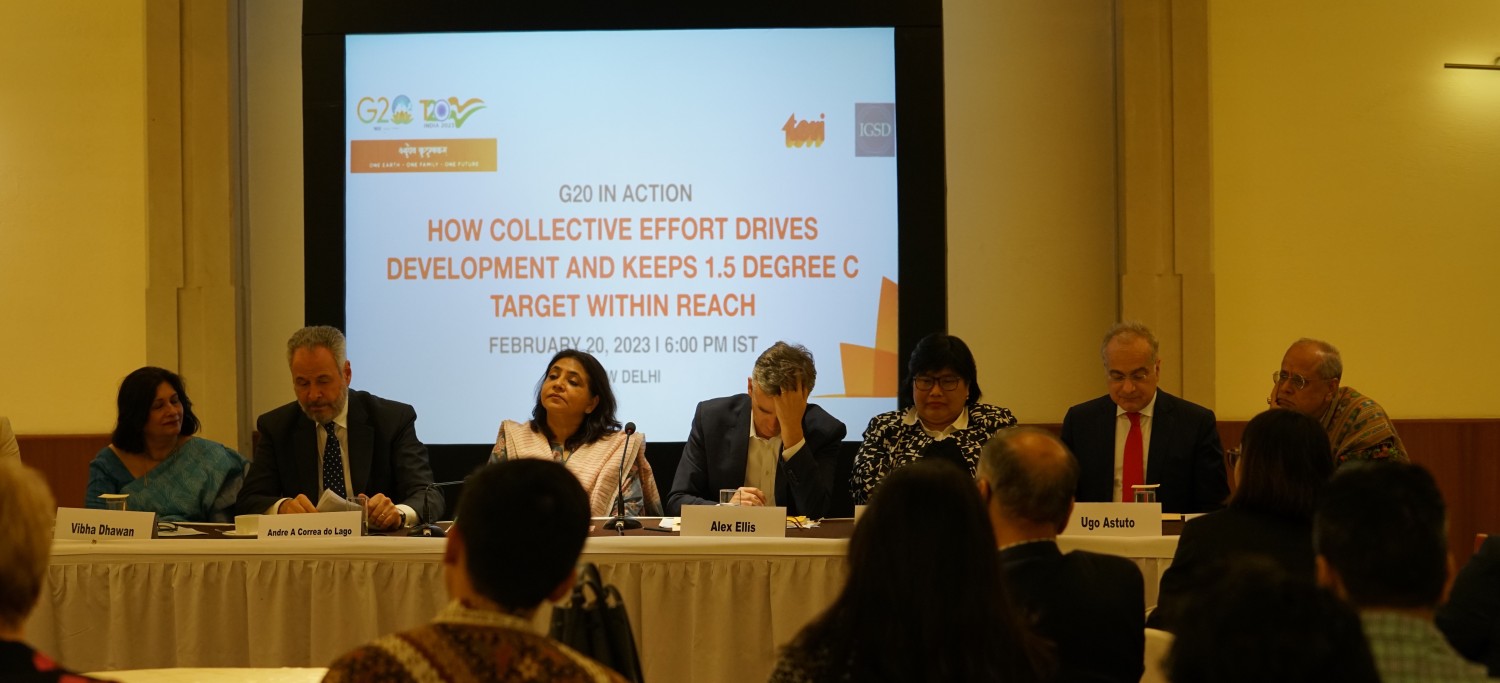EU, UK, Brazil, Indonesia Call For Collective Action By G20 Nations to Accelerate and Scale Climate Action

21 February 2022, Delhi, India ⎯ At the official G20 prelude to the World Sustainable Development Summit 2023, co-hosted by The Energy & Resources Institute (TERI) and the Institute for Governance & Sustainable Development (IGSD), key ambassadors from G20 countries addressed the challenges and opportunities for collective action to accelerate and scale climate action and deploy climate finance in this decisive decade.
During the discussion How collective effort drives development and keeps 1.5 degree C target within reach, distinguished speakers highlighted that the earth is warming at record speed and could careen past the 1.5°C safe temperature limit as early as 2026. To prevent the worst consequences, global decision-makers must address the twin challenges of 1) long-term climate stabilization, and 2) urgently slowing the rate of near-term warming.
Keynote speaker, Ms. Richa Sharma, Additional Secretary Ministry of Environment, Forest and Climate Change (MoEFCC), and distinguished panelists shared how each country is transforming the world, bending the emissions curve, and building resilience to address this global challenge. Her Excellency, Ms. Richa Sharma said,
“India’s climate policy is informed by its vision of inclusive growth, for all around social and economic development, eradication of poverty, and further adherence to the foundational principles of the UNFCCC, rational utilization of the fair share of the global carbon budget, and climate-friendly lifestyles within the backdrop of deep-rooted cultural tradition of reverence for nature.”
Key developments:
Mr. Andre Aranha Corrêia Do Lago, Ambassador of Brazil:
“President Lula committed to very ambitious changes in the environmental dimension of our efforts, as well as in the decoupling of growth and emissions... What I think we have to do within the G20 is share the experiences and show that things are possible.”
Mr. Alex Ellis, British High Commissioner, delineated a number of policy instruments and keys to addressing climate cooperatively, including funding, procurement, trade, and regional cooperation. He also emphasized that conflict can compound the climate problem, and further stressed the importance of internationalism.
Ms. Ina Hagniningtyas Krisnamurthi, Ambassador of the Republic of Indonesia, emphasized the extreme vulnerability of some nations facing climate change and further underscored the role of regional and global cooperation to support the countries most impacted by the crisis.
“Developing countries should not do this alone, and we need the support of our developed partners to achieve those targets, especially 3 approaches: financing for climate action, investment for energy transition, the establishment of an effective and equitable carbon market.”
Mr. Ugo Astuto, Ambassador of the European Union:
“We all need to focus on action on mitigation in the coming months because if the current action continues, we are not going to achieve the Paris targets... [T]he G20 can help to focus the minds further and inject new momentum in this mission to leave a world for the next generation that is fit for habiting... The challenge is global and the response must be collective”
Mr. Atul Bagai, Head of the United Nations Environment Programme India Office:
“The Montreal Protocol is the most successful international agreement... and it gives us a very good model and an example of how we can use that model for climate change. That model is a model of reaching consensus... and we need to look at that from a perspective of addressing climate change.”
Background
In India, the World Bank predicts that by 2030, rising temperatures, heat stress, and extreme weather could jeopardize approximately $150-250 billion USD -- that is 4.5% of the nation’s GDP at risk in this decade. Heat waves are increasing, and India is expected to soon become one the first place in the world to surpass the limit of “human survivability”. In other words, it will be too hot to sustain life. In food production, the lack of adequate cold chains results in approximately USD$1 trillion in economic losses each year globally and is responsible for 9% of lost production of perishable foods in developed countries and more than 17% in developing countries.
Reducing climate risks and staying within the agreed limits to effectively combat global warming is critical to survival. Doing so will allow countries and communities to build resilience, strengthen national policy to implement climate action, and buy critical time for longer-term action to decarbonize. Countries have long recognized the need for collective action to address the climate crisis. It is time for every very country, institution, financier, and major decision-maker to join forces to solve this crisis.
The event recording is available here.
For press inquiries contact Udayvir Ahuja, udayvir.ahuja_i@teri.res.in (TERI).
